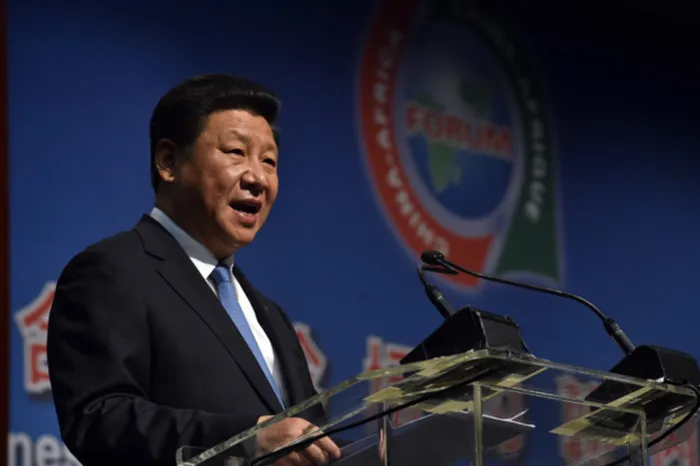Focac: The 24th anniversary of the Forum on China Africa Co-operation

China’s President Xi Jinping addresses the Focac summit in Sandton, Johannesburg, in 2015. To help African countries improve their export capabilities, China has granted complete tariff exemptions for 95 percent of all African export products. The European Union continues to limit imports from Africa by imposing quotas or total import prohibitions for entire industries, such as citrus fruit and meat. – Picture: Elmond Jiyane / GCIS
By Dr André Thomashausen
The first Forum on China-Africa – Focac was held in October 2000. It assembled the leaders and representatives of 44 African States who adopted the Beijing Programme for China-Africa Co-operation in Economic and Social Development. The agreed core Focac principles were those of Peaceful Co-existence, Friendly Relations, Liberation Solidarity and win-win Common Development Policy.
The forthcoming 9th Focac Summit in Beijing, September 4 to 6, 2024, will assemble all African nations (except for one small monarchy), to solidify and expand further the unique partnership of Africa with China.
At the onset of Focac, in 2000, China recorded a GDP of US$960 per year and capita. China’s GDP per capita and year has since then grown 13 times and will surpass US$13,000 in 2024.
Over the past 24 years, China has lifted over 770 million nationals out of poverty into a middle-class existence. At the same time, China reduced its carbon emissions by a world-record 34.4 percent. China today is the World’s leading developer and supplier of photovoltaic equipment and electric vehicles, amongst many other advanced industrial products.
Over the same 24 years, China committed an aggregate amount of capital (Development Aid, FDI and JV investments) to Africa in excess of US$200 billion, representing 20 percent of all FDI in Africa. The total Focac trade volume for 2023 is US$282 billion. Of this total, over US$50 billion are attained with South Africa.
Africa’s vital infrastructure today exists because of Focac. Electronic and mobile connectivity throughout the continent runs on Huawei and ZTE technology. China has financed, supplied and installed road and rail transport, ports and airports, water and sanitation, electricity distribution and generation, hospitals, government building infrastructure and even the headquarter installations of the African Union (AU) in Addis Ababa.
Amongst the many thousand examples, the most recent inauguration of the digital mineral resources data base at the Geological Institute of Angola (IGEO) stands out as a tool for the transparent and effective management of natural resource exploitation.
As of 2023, China has sent cumulatively 24,000 medical team members to Africa. A total of 45 medical teams are currently working at more than 100 sites in 44 African countries. China has established 67 Confucius Institutes and 10 Confucius Classrooms in Africa. A total of 16 Luban Workshops have been set up in 14 African countries, while more than 80,000 African bursary students are currently studying in China.
The first radical development agenda for Africa was presented in 2001 under the “Nepad” acronym by South Africa’s President Thabo Mbeki and Nigeria’s President Obasanjo. It proposed rebuilding Africa’s essential infrastructures with a Western capital injection of US$64 billion, spread over 15 years.
The US and Europe rejected Nepad and spent instead a total of 1.6 trillion USD, starting in 2002, in what they called their “war on terror”.
If not for Focac, Africa today would still be without modern airports, rail, essential buildings and modern communications.
The African continent is home to nearly 20 percent of the World population. However, its share of global GDP is less than 3 percent. Africa has at its disposal only 6 percent of the World’s energy.
To help African countries improve their export capabilities, China has granted complete tariff exemptions for 95 percent of all African export products. In contrast, the European Union continues to limit imports from Africa by imposing quotas or total import prohibitions for entire industries, such as citrus fruit and meat.
Because of the misalignment of developmental needs and available capital, African states are spending up to 70 percent of their national incomes on the servicing of debt. Focac has already four times granted debt relief to all Heavily Indebted Poor Countries (HIPC) and Least Developed Countries (LDC) in Africa.
At its 24th Anniversary, Focac will finalise and adopt a three year action plan to begin a new journey of modernisation of state governance, industrialisation and agriculture, as well as peace and security.
The Focac Summit 2024 will be the largest diplomatic event hosted by China in recent years. It will be attended by over 40 Heads of Stare, by the UN Secretary General and the chairperson of the African Union, as well as many other regional organisations and UN Agencies.
In the run up to its 25th anniversary in 2025, the Focac Summit in Beijing, on the 4th to 6th September, will be inspired by the development hopes of Africa’s 1.2 billion people.
* Dr André Thomashausen is a German Attorney and Professor Emeritus of International Law (Unisa).
** The views expressed here are not necessarily those of The African